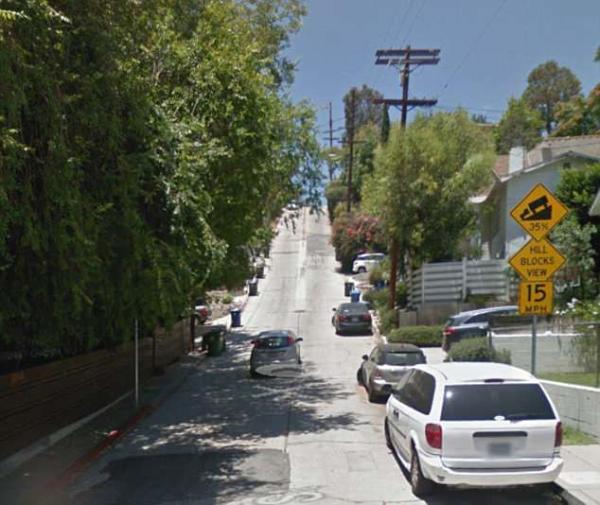Some motorists swear by smartphone driving apps, because they can save time by guiding them around traffic snarls. But others are finding that the technology can actually imperil their safety by steering them into hazardous places.
And in Los Angeles, with scores of unwitting drivers being re-routed to one of the steepest streets in the United States – and not having any idea of the frightening toll they'd pay for taking the road less traveled – city officials just announced that new safety measures are being put in place.
 Baxter Street, which on a two-dimensional screen looks like a sweet shortcut, is, in 3-D actuality, a dangerously steep thoroughfare that can be treacherous, especially in the rain, and especially for those who do not know what to expect ahead. Here's a video of what it feels like to drive it. It's pitched at a 33 percent grade, making it, by most estimates the 10th steepest street in the country. But note: that's not much tamer than the nation's steepest. That honor of goes to Canton Street in Pittsburgh, which is angled at a 37 percent grade.
Baxter Street, which on a two-dimensional screen looks like a sweet shortcut, is, in 3-D actuality, a dangerously steep thoroughfare that can be treacherous, especially in the rain, and especially for those who do not know what to expect ahead. Here's a video of what it feels like to drive it. It's pitched at a 33 percent grade, making it, by most estimates the 10th steepest street in the country. But note: that's not much tamer than the nation's steepest. That honor of goes to Canton Street in Pittsburgh, which is angled at a 37 percent grade.
The ridiculous verticality of LA's Baxter Street, with its up-angles interspersed with plateaus and ridges, often makes longer vehicles, like buses and limousines, bottom out and literally get stuck on the pavement. As for unfamiliar motorists with higher clearances, steep uphill drives are often scary attempts that invoke fears of slipping backward uncontrollably, while the act of venturing downhill can be flat-out terrifying, particularly after dark or during inclement weather.
 After multiple reports from flipped-out drivers, as well as locals having to put up with a growing stream of motorists trying to navigate this tricky terrain, Los Angeles lawmakers have instituted safety changes.
After multiple reports from flipped-out drivers, as well as locals having to put up with a growing stream of motorists trying to navigate this tricky terrain, Los Angeles lawmakers have instituted safety changes.
"I share in the frustration of residents with drivers utilizing narrow, hillside residential streets for cut-through traffic, especially one as steep as Baxter," said Mitch O'Farrell, a city councilman, as quoted by the Los Angeles Times.
And if being crazy-steep isn't enough, think about navigating Baxter with vehicles going past each other in both directions. Some of the safety changes being implemented starting May 22 will include converting the street, in parts, to one-way stretches.
Some drivers love these navigation apps, like Waze. Other people, like those living on quiet, out-of-the-way streets that are suddenly inundated with traffic, hate them with a passion. And then there's another group: those who are surprisingly terrified after the app takes them for a ride they'll likely never forget.




